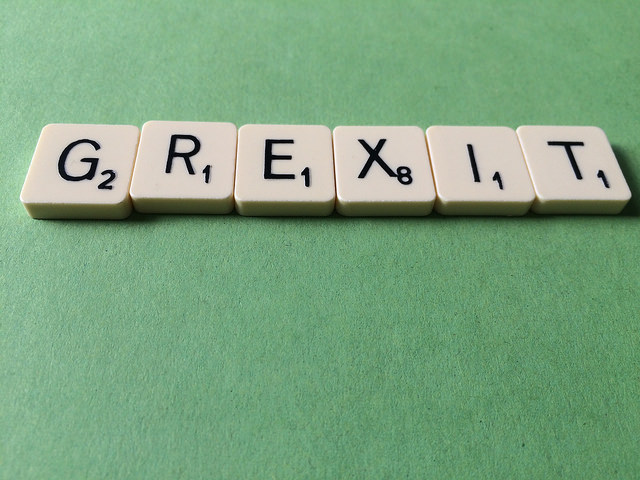The Labour Party’s European policy under Jeremy Corbyn: no Brexit, no Grexit
Jeremy Corbyn’s surprise election as leader of the Labour Party shone an unexpected light on his views regarding European integration. A previously known Eurosceptic, he has stated since his elevation that he’d campaign for the UK to remain in the EU regardless of the result of any putative renegotiation. Here, Isabelle Hertner casts an eye over Corbyn’s new European policy, and argues that a ‘no Brexit, no Grexit’ European policy places us in the midst of interesting times.
During the Labour Party’s 2015 leadership campaign, frontrunner Jeremy Corbyn was asked to clarify his position on the United Kingdom’s membership of the European Union. In particular, pro-European Labour activists, MPs and MEPs expressed some concern over the candidate’s European vocation. After all, in a hustings during the early days of the leadership campaign, Jeremy Corbyn stated that he would not rule out campaigning for a no vote in the UK’s future EU membership referendum owing to David Cameron’s position on workers’ rights. Since his election as Labour Party leader with a huge majority of nearly 59.5 per cent of first-preference votes. Jeremy Corbyn is now the Leader of the Opposition, and with great power comes great responsibility (a quote that fans of the Spiderman film will remember). In particular, Corbyn has been pressed by his colleagues to reveal his position on the UK’s approaching referendum on EU membership. But what is his position?
For a start, he is highly critical of David Cameron’s decision to put the UK’s EU membership to a referendum. He called the referendum ‘unnecessary’ and ‘a cynical, opportunistic ploy to try and win back anti-EU votes that had switched from Tories to UKIP’. Former Labour leader Ed Miliband had also tried to avoid a referendum on EU membership, but was more cautious in his criticism.
Corbyn has since emphasized that he wants the UK to remain in the European Union. In a leaked speech on the EU referendum, he declared:
‘It is no secret that I am a convinced internationalist. I have seen far more support from the European Parliament for great international causes of human rights and justice from Palestine to Colombia than I have from any national parliament, including my own.’
Yet, despite his inherent internationalism – and in line with his predecessors, including Blair, Brown, and Miliband – Jeremy Corbyn stresses the need for EU reform. He argues that the Labour Party should work with its European sister parties in order to reform the EU from within. But what type of reforms does the new Labour leader envisage?
Here he does not go into great detail. We should, however, expect more concrete proposals as the referendum approaches. At this stage, Corbyn only reveals a vague idea of his EU reform plans. For instance, he wants the EU to promote stronger rights and better opportunities for workers. He also demands ‘a programme for re-launching European-wide growth based on social justice and productive investment’. The new Labour leader is also very critical of the EU and International Monetary Fund’s management of the Greek debt crisis and opposes ‘the current austerity ideology of the dominant European People’s Party’. What is more, he seeks to address levels of corporate taxation across Europe. Unsurprisingly, he supports a more outspokenly left-wing agenda for the EU than his predecessors.
What next?
Optimists might hope that Jeremy Corbyn’s election as Labour Party leader will lead to a much needed, more politicised EU debate in Britain. In the past, the EU debate between Britain’s main parties tended to be dominated by the ‘in or out’ of the EU question. His more recognizably socialist EU agenda, future discussion could reveal the ideological divisions between the socialist, conservative, liberal, and green EU agendas of Britain’s parties. A more politicized EU debate that offers clear alternatives of the EU’s future could, in turn, lead to a more engaged public. Such a development could be beneficial for the UK, where public levels of EU knowledge and interest in EU matters are very low.
Pessimists, on the other hand, might point out that for the Labour Party and for David Cameron’s Conservatives, any notion of a common campaign for a yes during the referendum will be impossible. After all, their positions on issues such as intra-EU immigration and workers’ rights are miles apart. The Prime Minister wants to restrict EU migrants’ access to unemployment benefits, whilst Jeremy Corbyn highlights the cultural, social and economic contributions migrants make to Britain. There is a saying in German that ‘while two parties argue with each other, the third one wins’. In the context of the UK’s EU referendum, due to the irreconcilable EU visions of the UK’s two major parties, the winner may well be the deeply Eurosceptic UK Independence Party which campaigns to leave the EU.
Meanwhile, the yes and no campaign groups have already formed at Westminster and elsewhere in the UK, spreading their messages. Corbyn can now decide on his strategy. He can sit on the fence and wait for the result of Cameron’s re-negotiation of the UK’s relationship with the EU. Once the results of these negotiations are known, he can react. Another possibility is for Labour to kick off its campaign very soon and present a pro-integrationist, comprehensive EU reform agenda.
These are exciting times to study the Labour Party’s European policy. Watch this space!
—
Note: this post originally appeared on the PSA blog and is reposted with permission. It represents the views of the authors and not those of Democratic Audit or the LSE. Please read our comments policy before posting.
—
 Isabelle Hertner is Lecturer in German and European Politics and Society at the University of Birmingham. Her academic profile can be found here.
Isabelle Hertner is Lecturer in German and European Politics and Society at the University of Birmingham. Her academic profile can be found here.






 Democratic Audit's core funding is provided by the Joseph Rowntree Charitable Trust. Additional funding is provided by the London School of Economics.
Democratic Audit's core funding is provided by the Joseph Rowntree Charitable Trust. Additional funding is provided by the London School of Economics.
The @UKLabour European policy under @jeremycorbyn: no #Brexit, no #Grexit https://t.co/3Pi91dF80o
The #Labour Party’s #European #policy under Jeremy Corbyn: no #Brexit, no #Grexit https://t.co/qvJFrUSBV0
UKIP must be dancing with sheer relief if the new Labour leader now appears to campaign for more centralised control by the EU over the UK’s affairs. Studies and internal polling had shown that Labour defectors to UKIP might have been won back by Corbyn (an irony but there are many such in politics) and UKIP’s advance there halted. Now that latest polling by yougov shows UKIP to be on the highest % since the General Election, Labour will be handing a gift to UKIP and confirm the research of academics like Ford and Goodwin who have predicted this for a long time.
The new Labour leader is well aware that UKIP is in second place in a large swathe of Labour seats in the north of England – if he appears to side with the EU over issues like the TTIP (the secretive and undemocratic trade ‘agreement’ between the EU and USA being rammed through), and go for flaccid ‘safeguards’, and if he appears to affect support for UK jobs while effectively bowing to the EU and its austerity agenda, then he will suffer a serious setback in the North, in a similar way to the one Labour suffered in Scotland.
Northern voters are now aware of the cry – which the faded LibDems used to rightly make – ‘only we can beat Labour here’…but it is now being made by UKIP. Working class voters in the North will not be happy to sign up for even more control over their lives by those they cannot vote for, accept vast numbers of migrants with few questions asked, and nor will they tolerate a Labour leader effectively supporting the same policies as the Tories. Policies enforced by the EU – already the EU has made clear that some of Corbyn’s supposed policies will not be allowed. It is good news for UKIP (if not for the UK) that he will simply bow to the EU like Tsipras and be the enforcer of the demands of the EU.
For example, Corbyn will have problems with infrastructure investment and his People’s Quantitive Easing, as he has outlined, as these plans contravene Article 123 of the Lisbon Treaty on public spending through printing money. The EU will oppose these and will strike them down if necessary, as it decides and not the UK.
The Labour Party’s European policy under Jeremy Corbyn: no Brexit, no Grexit https://t.co/8kMmGASmlc
The Labour Party’s European policy under Jeremy Corbyn: no Brexit, no Grexit https://t.co/tjwwuxgPu8 https://t.co/0IKnL45NN0